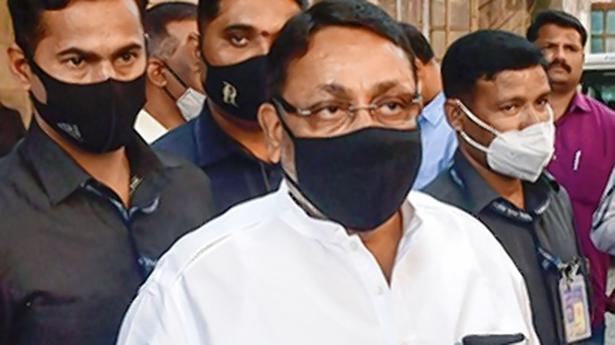
Nawab Malik arrest | Those who speak the truth are being harassed, says Sharad Pawar
The Hindu
NCP chief Sharad Pawar leads attack on BJP-led Centre, following the arrest of Maharashtra Minister Nawab Malik
Nationalist Congress Party leaders threw their weight behind Maharashtra Minority Affairs Minister Nawab Malik, who was arrested by the Enforcement Directorate on Wednesday following a gruelling interrogation in connection with a money laundering case.
Earlier, NCP chief Sharad Pawar rebuked the Bharatiya Janata Party (BJP)-led Central government, remarking that Mr. Malik was being harassed for being vocal against the Centre’s misuse of central agencies and that there was “nothing surprising” about the interrogation.
Following Mr. Malik’s arrest, a meeting between Chief Minister Uddhav Thackeray, Mr. Pawar and State Home Minister Dilip Walse-Patil is to take place at Mr. Thackeray official residence ‘Varsha’ later today evening. The BJP has called for Mr. Malik's resignation, with BJP State president Chandrakant Patil stating that the NCP leader had no moral claim to being part of the State cabinet now.
Earlier, the leadership of the tripartite Maha Vikas Aghadi (MVA) government [of the Shiv Sena, the NCP and the Congress] lashed out at the BJP with Mr. Pawar spearheading the verbal charge.
“We were certain that something like this would happen soon. Nawab Malik had been outspoken against the Centre and its misuse of agencies…Those who express their views openly against the BJP government and the investigating agencies, those who speak the truth, are being harassed,” said the NCP chief.
He further said that it was very easy (for the Centre) to invoke Dawood Ibrahim’s name particularly in regards to a Muslim party activist against whom some old case will be dug up by the agencies.
“It is easy to link a Muslim [political] worker with Dawood [Ibrahim]. I also faced similar allegations when I was Chief Minister of Maharashtra. An environment was created [against me] which lasted for some 25 years… Link people with a name, harass and defame them by misusing power. The same is happening in this case,” Mr. Pawar said.

 Run 3 Space | Play Space Running Game
Run 3 Space | Play Space Running Game
 Traffic Jam 3D | Online Racing Game
Traffic Jam 3D | Online Racing Game
 Duck Hunt | Play Old Classic Game
Duck Hunt | Play Old Classic Game

















